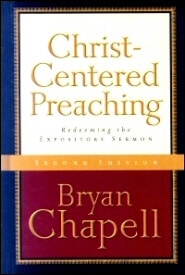Even if you’ll never preach a single sermon in your entire life, you should still know what good preaching is. And not just so you can spot (and avoid) bad preaching; not even so you can seek out good preaching. You need to understand what makes a good sermon because every time you interpret the Bible, practically speaking, you’re preaching the Bible to yourself.
How good are your self-sermons?
Much of the process of preparing a sermon is indistinguishable from the process of simply reading the Bible and applying it to your life. You may not have to pay attention to your gestures and vocal projection as a preacher does, but you will have to do almost everything else. Faithful Christians should give attention even to the rhetorical structure of their arguments about a passage—in evangelistic discussions, in small-group Bible studies, even in Facebook comments.
A common error

A Be-Like message is one in which the exhortation basically boils down to, “Be like such-and-such Bible character.” Abraham, Moses, and other Old Testament characters are commonly used in this approach. A Be-Like Bible study session is one in which you come away with five character qualities in characters such as Noah, Gideon, Rahab, or Jephthah that you want to emulate.
What’s so wrong with this? Not everything. Before I explain more fully, let me give an example from a real-life sermon. (Details have been changed and amalgamated, so don’t try to figure out where I heard this.)
A Be-Like message
The speaker took his message from the book of Numbers, and he focused on Caleb and Joshua and their faithful work as spies in Canaan. The point of the sermon was precisely, “Be Like Caleb and Joshua.” The character qualities the hearers were to emulate were conveniently summarized with three C’s: “Commitment,” “Conciliation,” and “Character.”
Coast to a stop. Sing “Just As I Am.” Bow head. Close eyes. Come forward. Pray. Done. (Check text messages missed during service.)
Your denomination or tradition may end services a little differently, but I’ve heard sermons fitting this basic format from across the evangelical spectrum—and beyond. So has Bryan Chapell, apparently.
Leaving aside the fact that alliterated points tend to twist Scripture to fit the alphabet (and some lonely letters, such as Q, never get used), why would Chapell and I complain about such a sermon?
Because Be-Like messages misrepresent the Bible by delivering law without gospel, obligations without the divine grace necessary to carry them out.
Law and gospel
Though it doesn’t hurt to be reminded, sermon listeners in Christian settings are generally well aware of our duties. We find ourselves instead in the place Paul did in Romans 7, asking a question that a “Be-Like” message never answers. We want to know, “Why can’t I ever seem to fulfill all these duties?” In Paul’s words, “Who will deliver me from this body of death?”
The answer Paul gives, of course, is the grace of God in Jesus Christ our Lord. The grace of God does not nullify the doing of my duty; it empowers it. I listened hard throughout that message on Caleb for any mention of God’s grace, and I did hear it—in the only place I am likely to hear it in a “Be-Like” message: the closing prayer. The preacher asked God for “help.” Good! But grace was to be found nowhere else in the sermon, even though it was most certainly in the passage.
Finding plumb
Some preachers and theologians today are overreacting to the Be-Like messages they hear. They say that Caleb is not in the Bible as an example of good works at all but solely as part of a story of God rescuing the world. Some evangelicals are indeed on one side of a pendulum swing. (This is actually an old debate, and you can read about it in many places—see point 15 in John Frame’s famous essay, “Machen’s Warrior Children,” available in his Collected Shorter Writings.) But my impression is that most Bible-reading Christians are on the other side of that swing. For them, Bible characters are in the text almost solely as heroes to be emulated or, occasionally, as villains to be excoriated.
We need to come to scriptural plumb, where the indicatives of God’s grace (the things God has done for us in Christ) always flow into the imperatives of our duty (the things we must now do as new creatures in union with Christ). This is the biblical pattern—visible even in whole books such as Romans and Ephesians. We work out our own salvation with fear and trembling because it is God who works in us to will and to do His good pleasure (Phil 2:12–13). Be-Like messages give us the imperatives but leave out the indicatives that make them possible.
And those indicatives are in the text of Scripture; you don’t have to add them. They were even there in Numbers when Caleb and Joshua repeatedly appealed to God’s power (and not their courageous character) to enable their victories. And they were there as part of the overall context of Numbers and of the story of Scripture.
The whole book of Numbers is part of the outworking of God’s promise to Abraham. The question it asks is, “Will the seed God promised to Abraham get the land he promised Abraham—even if that seed is faithless?” During the first 10 chapters of Numbers, the people of Israel prepare to enter that land; the main reason they fail to do so in the next section of the book (chapters 11–21) is that they listen to the 10 faithless spies who give a “bad report” (Num. 13:32) of the land—instead of to Joshua and Caleb. The Israelites end up spending 40 years in the desert, seeing the death of the entire generation which crossed the Red Sea, because they spurned the grace of God offered them through Joshua and Caleb. Yes, we should emulate the faith of those two men, but we should also see behind and in their story a gracious God reaching out to his people.
Zooming out a little to the story of the Old Testament, the fact that most of the spies and most of the Israelites were faithless despite experiencing the miracles of the Exodus is itself an indication of the grace of God. These faithless people quite obviously didn’t get chosen by God to be His treasured possession because of their good works! God says in Deuteronomy,
It was not because you were more in number than any other people that the LORD set his love on you and chose you, for you were the fewest of all peoples, but it is because the LORD loves you and is keeping the oath that he swore to your fathers, that the LORD has brought you out with a mighty hand and redeemed you from the house of slavery, from the hand of Pharaoh king of Egypt. (Deuteronomy 7:7-8 ESV)
And another major theme of the divine story shows up here: God’s grace in the book of Numbers goes not just to his people but even to the Gentiles. Caleb was a Kenizzite, a descendant of Esau and therefore not part of the line of promise. This, too, was part of God’s promise to Abraham—that “all the families of the earth” would be blessed (Gen. 12:3).
Neither Jews nor Gentiles deserve God’s mercy, but we all get it. That’s grace.
Redemptive Bible study
Bryan Chapell says that we as Bible readers must “honor the care that the Bible . . . takes to tarnish almost every patriarch or saint within its pages.” We fail to honor that care when our goal in Bible study is always to find the positive character qualities in a given Bible character, write them down, and add them to our spiritual to-do list.
The positive examples of David and Gideon and Noah are indeed provided for us to emulate. And their sins are recorded, in part, so that we might learn moral lessons from them, too: David’s adultery, Gideon’s apostasy, Noah’s drunkenness. Paul even says that the fact that most of the Israelites “were overthrown in the wilderness” owes to God’s purposes: “These things took place as examples for us, that we might not desire evil as they did” (1 Corinthians 10:5-6 ESV).
But the Bible is not primarily about us humans and what we have done or should do—that is secondary. The Bible is about what our creator God has done and will do to rescue us from the mess that our race’s fall into sin has gotten us into. Grace is suffused throughout the story of Scripture, because, fundamentally, we don’t deserve to be rescued. So everything God has done in this world—especially what he has done through Christ—is grace. The Bible is the story of what God is doing to glorify himself by redeeming his fallen creation.
Bring this understanding to your devotional times; watch out for (merely) Be-Like Bible study. Make sure instead to watch for the gracious action of God on every page.
Mark L. Ward, Jr. received his PhD from Bob Jones University in 2012; he now serves the church as a Logos Pro. He is the author of multiple high school Bible textbooks, including Biblical Worldview: Creation, Fall, Redemption.
***
Learn how to study the Bible in 10 days with a free Bible study course taught by the Logos Pros. In just thirty minutes a day, we’ll walk you through the essential Bible study steps of observation, interpretation, and application. Sign up below or learn more about the 10-day Bible study challenge.







